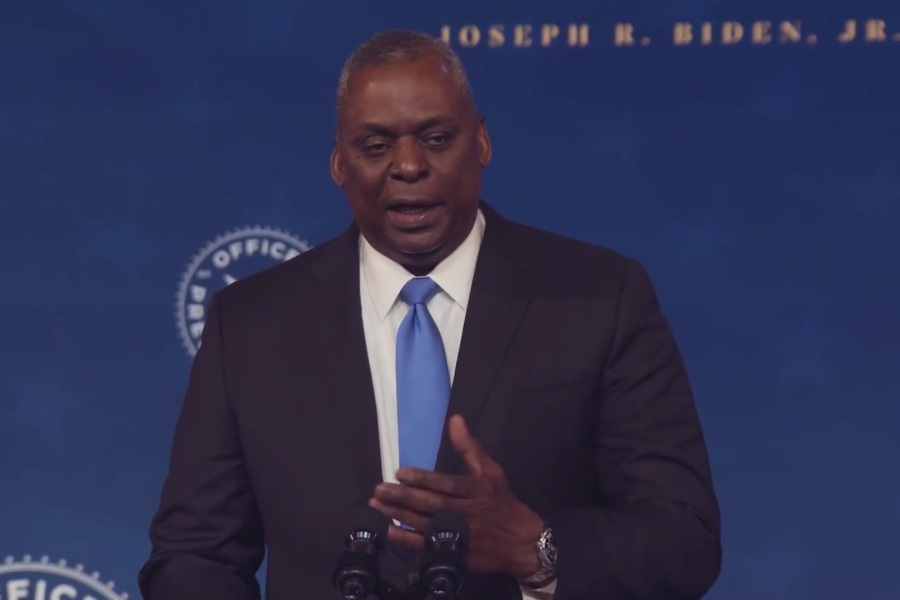President-elect Joe Biden called on Congress to “swiftly” confirm Lloyd J. Austin III as the next Defense Secretary, rebutting concerns that his plan to nominate the recently retired Army general chips away at civilian control of the military.
Introducing Austin at a Dec. 9 event in Delaware, Biden said the civilian-military dynamic has been under great stress during the Trump administration, during which multiple former uniformed personnel have served in top posts.
Civilian-military tensions were particularly on display over the summer, when Chairman of the Joint Chiefs of Staff Gen. Mark A. Milley apologized for joining President Donald J. Trump at Lafayette Square outside the White House shortly after authorities dispersed peaceful protesters with tear gas and rubber bullets.
“Secretary-designate Austin is going to work tirelessly to get it back on track,” Biden said. “There is no doubt in my mind whether this nominee will honor, respect, and on a day-to-day breathe life into the preeminent principle of civilian leadership over military matters in our nation.”
The President-elect announced Austin as his pick on Dec. 8.
Austin, a former U.S. Central Command boss who would become the first Black Defense Secretary, needs to earn a waiver from Congress to be considered for Senate confirmation. He would be only the third nominee in American history to receive that pass, which is required for candidates who have been retired from the military for less than seven years. He left after four decades of service in 2016.
Austin said he deeply appreciates that foundational American tenet of civilian control of troops, and plans to surround himself with “experienced, capable civilian appointees and career civil servants who will enable healthy civil-military relations grounded in meaningful civilian oversight.”
“When I concluded my military service four years ago, I hung up my uniform for the last time, and I went from being Gen. Lloyd Austin, to Lloyd Austin,” he said. “It is an important distinction, and one that I make with utmost seriousness and sincerity.”
Defense News reported Dec. 9 that Austin will testify before the House Armed Services Committee ahead of the chamber’s vote on a waiver. HASC Chairman Rep. Adam Smith (D-Wash.) secured a commitment from the Biden team that Austin will appear in order to assuage their skepticism about having a former general in the top civilian post for the second time in four years.
Austin will also speak to House leadership and the Senate Armed Services Committee, according to Biden spokeswoman Jen Psaki.
During the Dec. 9 event, Austin acknowledged other Black military trailblazers like Army Lt. Henry Flipper, the first Black man to graduate from the U.S. Military Academy in 1877; the Tuskegee Airmen; the Montford Point Marines; and retired Army four-stars Johnnie E. Wilson, who ran Army Materiel Command in the 1990s, and Colin L. Powell, the first Black Chairman of the Joint Chiefs Staff as well as Secretary of State. He also named retired Navy Adm. Michael G. Mullen, another former Joint Chiefs Chairman, among his mentors.
If he is confirmed, the top tier of Defense Department leadership will include two Black men for the first time: Austin as Secretary and Air Force Chief of Staff Gen. Charles Q. Brown Jr., who became the first Black officer to lead a military service this summer and is the only Black member of the Joint Chiefs of Staff.
Biden touted Austin’s experience running logistics as the U.S. moved personnel and equipment out of Iraq during the Obama administration, calling it the “largest logistics operations undertaken by the Army in 60 years.” The Biden team is betting that work has prepared Austin for the daunting task of supporting a nationwide coronavirus vaccine rollout.
They also spoke of diplomacy as a tool to strengthen American military alliances around the world, signaling a revitalization of the partnership between the Defense and State Departments.
“I’ve worked hand-in-hand with our diplomatic colleagues and our partners around the globe, and witnessed firsthand what we’re able to accomplish together,” Austin said. “I look forward to resuming this important work.”
Vice President-elect Kamala Harris noted the challenges ahead transcend the traditional battlefield as well as the pandemic, from cyberattacks to the effects of climate change.
“A seasoned, highly-decorated, and trailblazing commander, Gen. Austin reflects the very best of our nation,” she said. “President-elect Biden and I will work closely with him and our entire team of national security and foreign policy leaders to make sure the United States of America is safer and more secure than ever before.”
Editor’s note: This story was corrected Dec. 16 to accurately reflect the demographics of Pentagon leadership.
